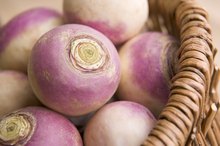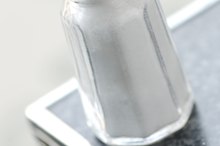Cholesterol & Potatoes
If you're worried about your circulatory health, there's little you can do that will help more than keeping your cholesterol levels within a healthy range. The single best thing you can do to make this happen is to understand and act on the ways different foods, like potatoes, interact with your blood serum cholesterol.
Cholesterol and Food
The cholesterol content of food -- dietary cholesterol -- isn't the important factor in keeping your cholesterol levels healthy. Instead, it's the fat content of the foods. Your body makes LDL cholesterol -- the bad cholesterol that hurts your circulatory health -- when you eat foods containing saturated fats. HDL cholesterol, the healthy cholesterol that helps your heart by cleaning out LDL, is produced when you eat foods rich in unsaturated fats.
- The cholesterol content of food -- dietary cholesterol -- isn't the important factor in keeping your cholesterol levels healthy.
- Your body makes LDL cholesterol -- the bad cholesterol that hurts your circulatory health -- when you eat foods containing saturated fats.
Potato Basics
Sweet Potato and Insulin
Learn More
Although classified as a vegetable, potatoes are closer to grain foods like bread and pasta. They are high in carbohydrates, low in fat and very high in starch. Some potatoes common in the American diet include white potatoes, red potatoes and sweet potatoes.
Potatoes and Cholesterol
According to the U.S. Department of Agriculture, potatoes are low in fat. White potatoes contain less than 0.1 g of total saturated and unsaturated fats per medium potato. Red and sweet potatoes contain less than half a gram. This means that potatoes will have little effect on your body's production of either harmful LDL or helpful HDL cholesterol.
- According to the U.S. Department of Agriculture, potatoes are low in fat.
- White potatoes contain less than 0.1 g of total saturated and unsaturated fats per medium potato.
Triglycerides
Do Shrimp & Scallops Increase Cholesterol Levels?
Learn More
Triglycerides are not technically a cholesterol, but they affect circulatory health like LDL and are measured in your total cholesterol readings. Your body makes triglycerides in response to spikes in your blood glucose levels. The high content of starch, sugars and other simple carbohydrates in potatoes means that they can stimulate your body to produce triglycerides -- which in turn can negatively affect your total cholesterol levels and your circulatory health.
Related Articles
References
- CDC: Dietary Cholesterol
- "Eat, Drink and Be Healthy;" Walter Willett; 2004
- American Academy of Family Physicians. High cholesterol. Updated December 5, 2019.
- MedlinePlus. High blood cholesterol levels. Updated February 22, 2018.
- Harvard Health Publishing. How it's made: cholesterol production in the body. Updated July 31, 2019.
- MedlinePlus. Cholesterol levels: what you need to know. Updated April 18, 2019.
- Lepor NE, Vogel RE. Summary of the third report of the National Cholesterol Education Program Adult Treatment Panel III. Rev Cardiovasc Med. 2001;2(3):160-5. doi:10.1001/jama.285.19.2486
- Familial Hypercholestrolemia Foundation. Surprising familial hypercholestrolemia statistics. Updated March 6, 2015.
- Cleveland Clinic. LDL cholesterol and heart health. Updated May 24, 2019.
- Harvard Health Publishing. 11 foods that lower cholesterol. Updated February 6, 2019.
- American Heart Association. Cholesterol medications. Updated November 10, 2018.
- American Heart Association. Prevention and treatment of high cholesterol (hyperlipidemia). Updated April 13, 2017.
- Centers for Disease Control and Prevention. Heart disease. National Center for Health Statistics. Updated February 21, 2020.
- National Heart, Lung, and Blood Institute. High blood cholesterol: What you need to know." Updated June 2005.
- Fallon Jr., L. Fleming. "Hypercholesterolemia." Health AtoZ, Gale Encyclopedia of Medicine. 2006. The Gale Group.
Writer Bio
Jake Wayne has written professionally for more than 12 years, including assignments in business writing, national magazines and book-length projects. He has a psychology degree from the University of Oregon and black belts in three martial arts.









